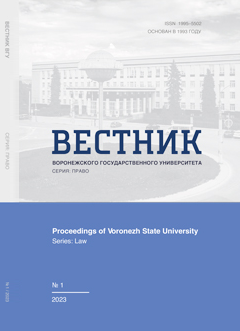Российская Федерация – правовое демократическое государство
Аннотация
В статье рассматриваются конституционные характеристики Российского государства после конституционной реформы 2020 года. Автор выдвигает аргументы в обоснование позиции о том, что Российская Федерация продолжает оставаться правовым демократическим государством и после внесения поправок в Конституцию РФ. Сделан вывод о том, что поправки не изменили и не размыли основы конституционного строя. Российская Федерация может считаться эталоном для называющих себя демократическими стран объединенного Запада, отказавшихся от верховенства права, многополярного мира, свободного и демократического развития других стран, не входящих в его состав, сделавших ставку на диктат и силовое решение назревших проблем мирового развития, не считающихся с общепризнанными принципами и нормами международного права.
Скачивания
Литература
Belosludtsev O. S. Theoretical and legal nature of the concept of constitutional identity // Comparative Constitutional Review. 2021. No. 3. P. 39–62.
Brezhnev O. V. Draft law on general principles of local self-government organization 2022: novelties and continuity in legal regulation // Municipal Service: legal issues. 2022. No. 2. P. 11–15.
Dolgikh F. I. Political competition in Russia and political parties // State power and local self-government. 2019. No. 2. P. 9–14.
Evdokimov V. B., Mochalov A. N. Constitutional values in constitutions and charters of subjects of the Russian Federation // Journal of Russian Law. 2021. No. 5. P. 28–42.
Eskina L. B. The electoral system as a factor of legitimization of representative power // Constitutional and municipal law. 2020. No. 5. P. 34–36.
Kolesnikov E. V. Constitutional foundations of building democratic legal statehood in the Russian Federation // State power and local self-government. 2016. No. 6. P. 12–16.
Kondrashev A. A. Trends in the constitutional development of Russia in the context of the constitutional reform of 2020 //Constitutional and municipal law. 2021. No. 11. P. 15–25.
Konovalchikov Ya. A. Interaction of political parties and the state as a constitutional and legal category // Actual problems of Russian law. 2018. No. 9. P. 74–81.
Konovalchikov Ya. A. The principle of equality of political parties in the electoral process // Russian Law Journal. 2021. No. 4. P. 42–54.
Mandryka N. N. General and unique features of the rule of law and their correlation with the principles of the rule of law // State power and local self-government. 2022. No. 9. P. 3–6.
Migushchenko O. N. Democracy and the unified system of public power // Municipal service: legal issues. 2022. No. 2. P. 5–10.
Osavelyuk E. A. Constitutional principles – fundamental legal ideas or guiding norms of law // Constitutional and municipal law. 2022. No. 1. P. 26–28.
Popandopulo V. F. Organization of public power as a guarantee of human rights and freedoms // Constitutional and municipal law. 2022. No. 10. P. 11–19.
Sisakyan A. K. Constitutional transformations of the system of public power and their impact on the formation of a positive constitutional legal consciousness // Constitutional and municipal law. 2021. No. 3. P. 14–17.
Spiridonov A. A. State, municipal and public control: content and correlation of concepts from the side of constitutional law // Actual problems of Russian law. 2022. No 5. P. 33–45.
Suntsova E. A., Matskevich O. V. Theoretical and legal analysis of the transformation of the forms of the state (political) regime of the Russian state // State power and local self-government. 2022. No. 4. P. 13–15.
Troshkina A. A. Constitutional implicit principles: on the question of the concept and meaning // Constitutional and municipal law. 2022. No. 9. P. 7–14.
Khabrieva T. Ya., Klishas A. A. Thematic commentary on the Law of the Russian Federation on the amendment to the Constitution of the Russian Federation of March 14, 2020 N 1-FKZ "On improving regulation of certain issues of the organization and functioning of public power". Moscow : Norm, INFRA-M, 2020. 240 p.










